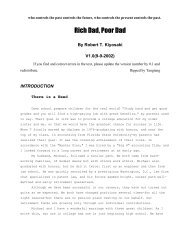Rich Dad, Poor Dad
Create successful ePaper yourself
Turn your PDF publications into a flip-book with our unique Google optimized e-Paper software.
who controls the past controls the future, who controls the present controls the past.<br />
In the world of the "asset column," being an Indian giver is vital to<br />
wealth. The sophisticated investor's first question is, "How fast do I get my<br />
money back?" They also want to know what they get for free, also called a piece<br />
of the action. That is why the ROI, or return of and on investment, is so<br />
important.<br />
For example, I found a small condominium, a few blocks from where I live,<br />
that was in foreclosure. The bank wanted $60,000, and I submitted a bid for<br />
$50,000, which they took, simply because, along with my bid, was a cashier's<br />
check for $50,000. They realized I was serious. Most investors would say, aren't<br />
you tying up a lot of cash? Would it not be better to get a loan on it? The<br />
answer is, not in this case. My investment company uses this as a vacation<br />
rental in the winter months, when the "snowbirds" come to Arizona, and rent it<br />
for $2,500 a month for four months out of the year. For rental during the offseason,<br />
it rents for only $1,000 a month. I had my money back in about three<br />
years. Now I own this asset, which pumps money out for me, month in and month<br />
out.<br />
The same is done with stocks. Frequently, my broker will call me and<br />
recommend I move a sizable amount of money into the stock of a company that he<br />
feels is just about to make a move that will add value to the stock, like<br />
announcing a new product. I will move my money in for a week to a month while<br />
the stock moves up. Then, I pull my initial dollar amount out, and stop worrying<br />
about the fluctuations of the market, because my initial money is back and ready<br />
to work on another asset. So my money goes in, and then it comes out, and I own<br />
an asset that was technically free.<br />
True, I have lost money on many occasions. But I only play with money I<br />
can afford to lose. I would say, on an average ten investments, I hit home runs<br />
on two or three, while five or six do nothing, and I lose on two or three. But I<br />
limit my losses to only the money I have in at that time.<br />
For people who hate risk, they put their money in the bank. And in the<br />
long run, savings are better than no savings. But it takes a long time to get<br />
your money back and, in most instances, you don't get anything for free with it.<br />
They used to hand out toasters, but they rarely do that these days.<br />
On every one of my investments, there must be an upside, something for<br />
free. A condominium, a mini-storage, a piece of free land, a house, stock shares,<br />
office building. And there must be limited risk, or a low-risk idea. There are<br />
books devoted entirely to this subject that I will not get into here. Ray Kroc,<br />
of McDonald's fame, sold hamburger franchises, not because he loved hamburgers,<br />
but because he wanted the real estate ; under the franchise for free.




